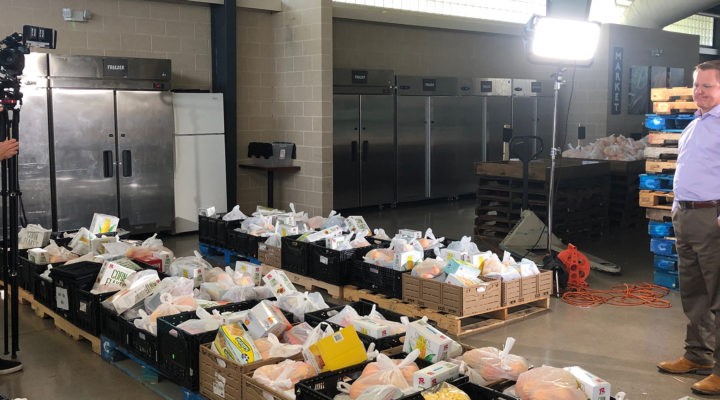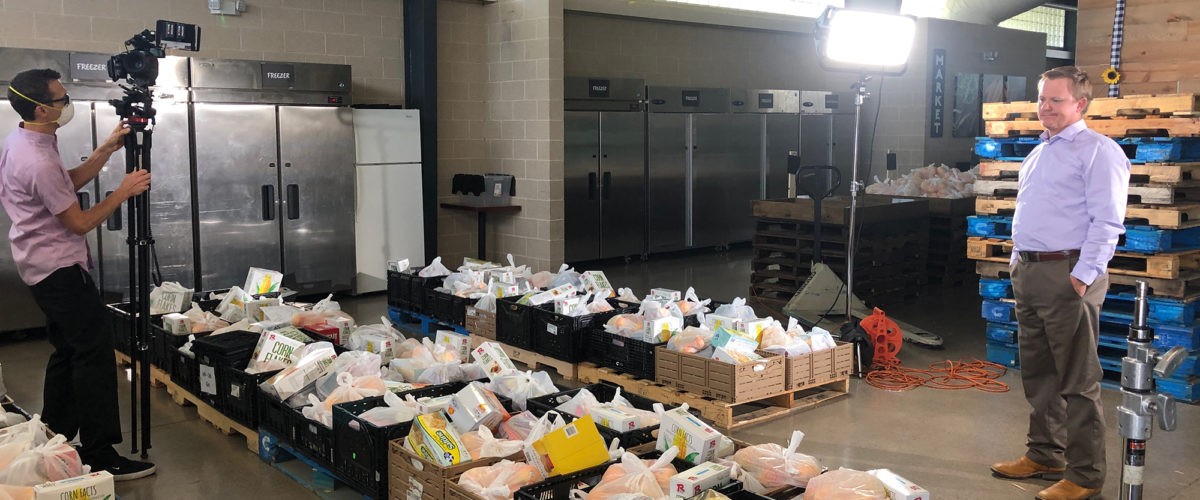Dallas residents Elizabeth and Ryan Schorman experienced the thrill of building a business from just an idea to a multi-million-dollar enterprise and now want to use their skills to help nonprofits that might not be able to afford professional video services.
After selling their successful camera accessories company, they launched their own nonprofit, GratiFILM, in January to provide low-cost and pro bono videography for nonprofits struggling to survive the COVID-19 pandemic.
The name is a reference both to the couple’s gratitude and to the gratis work they are providing. “We’ve been really fortunate in so many ways that we’re truly grateful for,” Elizabeth said. “This is just an opportunity to give back to organizations doing good work.”
‘The hands and feet of Christ’
Some of those on the receiving end of the Schormans’ work see an even greater force behind the couple’s altruism.
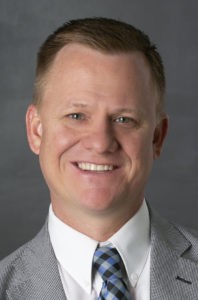
Wes Keyes
“They have been the hands and feet of Christ in ways that are truly remarkable,” said Wes Keyes, executive director of Brother Bill’s Helping Hand, a ministry that provides meals, groceries, medical services, job training and other services to West Dallas residents in need.
The Schormans’ video directing, shooting and editing is of cutting-edge quality and joyfully given, added Keyes, a former missions pastor at Cliff Temple Baptist Church. “You don’t get this kind of stuff pro bono, but they use their video skills to bless others and to bless us. I think it comes from them being deeply spiritual, quiet, super smart and definitely not ostentatious.”
The couple, who worship at First United Methodist Church of Dallas, strike a modest tone when describing their journey from founding, owning and operating a successful camera parts company, Wooden Camera, to now launching their nonprofit. They say it all flows from a desire to give back for all they have been given.
“We recognize what we’ve been entrusted with,” Elizabeth said. “We’ve just been really blessed. We have had so many pieces fall into place that, clearly, we cannot take credit for. God has really set things in motion throughout our lives.”
Wooden Camera
One of those pieces was Wooden Camera itself, which Ryan conceived and launched in the couple’s then-Houston home in 2011.
The firm manufactured components for high-end video cameras that typically cost $40,000 to $50,000 apiece and are used in film and commercial production and in some megachurches.
The company was named for the wooden camera models used to demonstrate the accessories, Ryan explained. The company began in truly humble beginnings and grew to employ more than 40 people and eventually included a store in Burbank, Calif., to meet the market demand in Los Angeles. NASA used one of its parts for a camera on a space flight.
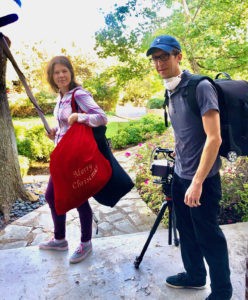
Elizabeth and Ryan Schorman on-site filming for The Well in Dallas.
Through it all, the couple built a reputation for person-to-person customer service, making a point to take every customer call and often personally shipping products to clients. They also created an employee culture imbued with the same principles.
“We had over 1,000 products and we wanted to make sure there was always a real person to help figure out what a customer needed,” Elizabeth said. “That was just our work ethic. To this day, Wooden Camera responds to every call, every day.”
She recalled that this approach derived in part from her work in banking, when it was routine to monitor communications at all hours of the day and night. “Even on Sunday night at 11 o’clock, you responded to your e-mail.” Both also credit their families for instilling in them the value of serving others.
The interest in video cameras came from Ryan, whose passion for video filming skateboarders segued into jobs producing video content for a car magazine, freelancing for an ad agency and becoming a freelance producer. He saw another company become successful producing camera accessories, which gave him the idea for Wooden Camera. At the time, he also was working as media coordinator at Houston’s South Main Baptist Church, where he and Elizabeth were members.
“I did some 3-D modeling and ordered the parts, launched a website, and our first quarter consisted of 50 units of an audio adapter that we sold online,” he said. “I would come home and send out two packages a day. We solicited youth (from the church) to come and pick up parts, assemble them at home and bring them back.”
In a recent Facebook post, Ryan explained that “Elizabeth and I decided to order enough parts to make 50 assemblies of the audio adapter. Eric, my father and a retired electrical engineer, would sit at our dining room table and solder cables while I assembled the product and coded the website.”
Finding what comes next
Last year, after the sale of their company was in its final stages and they prepared to move on, another interest began to emerge for the couple — the desire to use their talents to help nonprofit groups.
“Elizabeth and I have been making videos for some local charities to help them fundraise during COVID,” Ryan said in his Facebook post announcing their move from Wooden Camera to GratiFILM.
This was a natural progression, Elizabeth said. “At Wooden Camera we tried to be servant leaders, kind-hearted leaders and empathetic to our employees if they had child care situations or other issues going on in their lives. We also wanted to translate that into a nonprofit with the goal of helping organizations that have a passion for doing that for others.”
The Schormans had moved to Dallas — Elizabeth’s hometown — in 2012 to immerse Wooden Camera in the city’s tech-heavy atmosphere. They also wanted to be close to her parents. At the time, her mother, Sarah Stafford, was associate minister of music at Wilshire Baptist Church in Dallas.
The Schormans have produced fundraising, informational and educational videos for a number groups, including The Well Community, a ministry that serves persons struggling with mental illness, Brother Bill’s and New Song Community Choir, which was created by Elizabeth’s mother at Wilshire and became a stand-alone nonprofit in 2020.
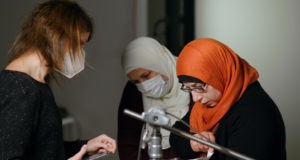
Elizabeth Schorman works with two Arabic-speaking women while filming a public service announcement for the Human Rights Initiative.
“We just finished a PSA for HRI — the Human Rights Initiative — which was multilingual and used animation to help HRI clients who don’t have legal status to understand their rights in seeking health care,” Elizabeth said of their current work.
As the projects multiplied, GratiFILM was created to better solicit volunteers and to accept applications from other groups and ministries. “We had people offering to pay us, but we didn’t want to be paid. That was awkward because our goal here is not to make money,” she explained.
Surviving the pandemic
The organization’s goal is to live out a passion to help others make a difference in people’s lives, she said. “And it’s just very interesting to us to find out what other people and groups are doing.”
What some of those groups are doing is surviving the pandemic thanks to the Schormans’ help, Keyes said.
In Brother Bill’s case, the couple produced informational videos about its response to COVID-19, and another video titled “We’re Still Here,” which was “a shout-out to our donors and volunteers that even if the pandemic has shut things down it hasn’t shut us down,” Keyes said.
In 2020, Brother Bill’s served 1.3 million meals, compared to 750,000 the year before, he added. “That video communicated that this pandemic is not over and we are here and serving more than we have ever served. We almost doubled the amount of money we raised last year with their help.”
Some results from the video work are harder to measure, but vital nonetheless, Keyes said. “It’s part of the us telling the whole narrative of Brother Bill’s, especially at a time when people are at home watching videos. You have to be telling your story, and we did that because Ryan and Elizabeth were able to capture that.”

